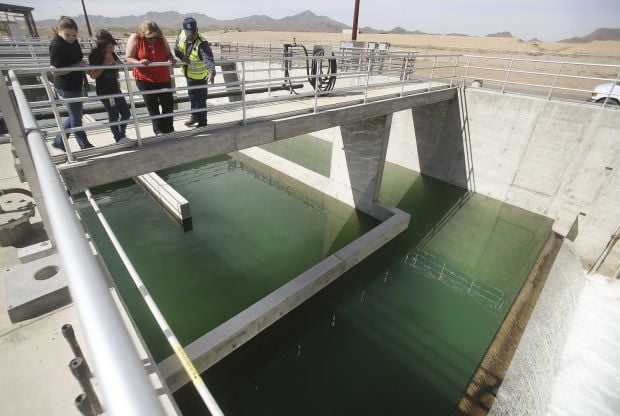After years of insisting that Davis-Monthan Air Force Base owed the county as much as $3 million in unpaid sewer connection fees, county officials now say it is likely that what the base has already paid more than covers its current demands on the system.
That conclusion was based on newly analyzed water and wastewater data that suggests that current demand is lower than it was in 1993, the last year the base paid connection fees before stopping inexplicably.
Connection fees are a one-time fee paid for new construction or substantial additions that require larger water meters. User fees, which the base has consistently paid since a 1988 agreement between the base and county, are billed monthly and based on volume.
“Based on water supply records for the period of 1987 to 1993, it is likely the payment of sewer connection fees during this period exceeds what is now the sewer flow,” Pima County Administrator Chuck Huckelberry wrote in an Oct. 3 memo, which outlined a proposed settlement to the years-long dispute hashed out during a Sept. 26 meeting between base and county officials.
Nevertheless, the unpaid connection fees were legitimately assessed, and the base had promised to pay them in a timely fashion in the 1988 agreement, but didn’t do so, according to Huckelberry.
“They got lucky,” Huckelberry quipped to the Star.
Data provided by the base and included in the memo shows that water production at the base, which has on-site wells, peaked at 813 million gallons per year in 1975 and declined significantly through the mid-2000s, before bottoming out at 244 million gallons in 2006. Between September 2016 and August 2017 the base produced a little more than 300 million gallons.
County Wastewater Director Jackson Jenkins said his office will soon review the base’s water figures.
Analysis of the new wastewater flow meter at the base, which was installed at Air Force expense, suggests that a little less than 60 percent of that water ultimately ends up in the sewer system.
If levels start to exceed the 1975 peak flow, which works out to roughly 488 million gallons annually going into the sewer, county officials say that would trigger negotiations between the base and county regarding possible additional payments for increased demand on the system.
While the county is not seeking additional connection fees now, it is asking the base to carry out significant infrastructure work to better handle heavy rainfall that spikes flows from the base into the sewer system.
Those surges disrupt treatment operations. The improvements are estimated to cost around $7.5 million.
The base, however, doesn’t have those funds available, according to a letter drafted by Huckelberry, reviewed by base officials and sent to U.S. Rep. Martha McSally on Oct. 3.
Davis-Monthan is seeking Air Force funds to pay for the work, and the letter was intended to get McSally’s help in that effort.
“Coupled with other water use reductions on the base, the stormwater infiltration reduction projects will bring base sewer capacity requirements in line with the capacity DMAFB has already purchased, and therefore resolve the connection fee payment dispute,” reads the letter, a copy of which was reviewed by the Star.
Huckelberry said the base is “on board” with the proposal.
“Davis-Monthan Air Force Base continues to work closely with Pima County to make progress toward resolving this issue,” base spokesman Capt. Joshua Benedetti said in emailed comments. “We appreciate our role as an integral member of this community and we value the relationship DMAFB and the county share.”
Jenkins said he was pleased negotiations resulted in a tentative deal, and said “we’re on the right path,” though he did concede getting the base improvements funded will likely take some time.
He said he’s hoping for a “good faith” effort on the base’s part, but if the base doesn’t get funding and flow spikes continue to be an issue for the county, “we may be back across the table.”
The board of supervisors will have to approve any final settlement agreement with the base. The county is also dismissing a notice of claim filed against the base on May 25.
The claim, which is a precursor to litigation, was a “last resort” for the county, Huckelberry said, adding that a negotiated settlement, as occurred, was its strong preference.
The claim, obtained by the Star, sought roughly $1 million, substantially less than the $2.7 million invoice the county sent the base in 2013. The lower figure does not include interest and also used the means of calculating connection fees adopted in 2012, not the older method in place during the base’s roughly quarter-century of nonpayment.
“That was a path we were on, and we are no longer on that path,” Huckelberry said of the possible litigation and ultimately successful negotiations.





